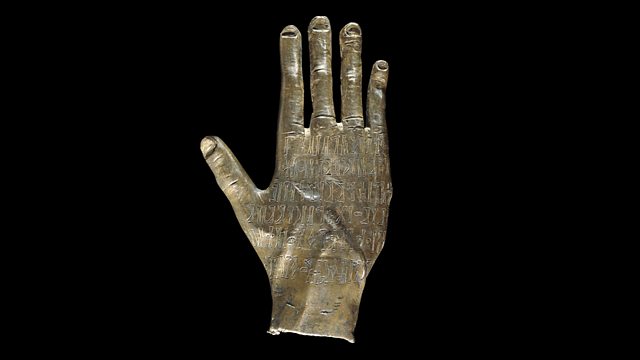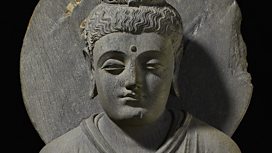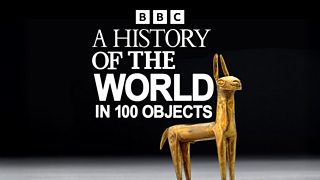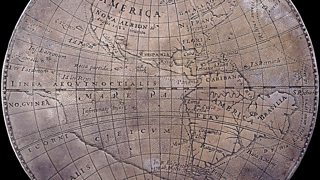Arabian bronze hand
Neil MacGregor's history of the world told through objects continues with an Arabian bronze hand from the time before Islam.
Throughout this week Neil MacGregor is looking at how the great faiths were creating new visual aids to promote devotion around the world of 1700 years ago. Having looked at emerging images from Hinduism, Zoroastrianism, Christianity and Buddhism he turns his attention to the religious climate of pre-Islamic Arabia. The story is told through a life sized bronze hand cut at the wrist and with writing on the back. It turns out to be not a part of a god but a gift to a god in a Yemeni hill village. Neil uses this mysterious object to explore the centrality of Arabia at this period, with its wealth of local gods and imported beliefs. The hand surgeon Jeremy Field considers whether this was the modelled from a real human hand while the religious historian Philip Jenkins reflects on what happens to the old pagan gods when a brand new religion sweeps into town.
Proudcer: Anthony Denselow
Last on
More episodes
Next
You are at the last episode
![]()
Discover more programmes from A History of the World in 100 Objects about religion
About this object
���dz����پ��Dz�:�� Yemen
Culture: Ancient Middle East
Period: 2nd - 3rd century AD
Material: Metal
��
This bronze hand was given as an offering to the god Talab Riyam in a temple in pre-Islamic Yemen. The right hand was traditionally a symbol of good luck and an inscription on the hand indicates it was offered in exchange for well-being. Parts of the hand are very realistic and it may have been modeled on the man who dedicated it, Wahab Talab. The fact that Wahab shares a name with the god suggests he was a person of important status.
What was Arabia like before Islam?
Before the arrival of Islam in AD 622, Arabia was ruled by a confederation of tribes known as the Himyarites. They dominated the trade route between the Roman Empire and India and grew rich on the export of the 'perfumes of Arabia' - frankincense and myrrh. When this hand was made paganism was already declining due to the popularity of Judaism and Christianity. Islam largely purged Arabia of its pagan past and objects like this are all that remain of this lost religion.
Did you know?
- Offering replicas of body parts at shrines was widespread - they've been found in Greek temples and medieval pilgrim sites.
Carefully crafted and quite beautiful
By Jeremy Field, consultant orthopaedic and hand surgeon
��
I’m sure this is a human hand, but there are certain things that are slightly odd about it. The scooped, or ‘spoon-shaped’, nails are really indicative of someone who might have anaemia. The fingers are really thin and spindly and also there is this deformity of the little finger, which I think is probably traumatic, which means the finger has probably been broken at some stage at the end of it.
What they have done so carefully is the impression of the veins, which would probably go against it being some form of amputation because if the hand was amputated the veins would be empty, because obviously the blood drains out. And these are very carefully crafted and really quite beautiful.
I think someone has actually drawn some skin markings in over the metacarpal phalangeal joints – over the knuckles at the base of the fingers. I don’t think that’s indicative of any form of disease or anything like that, but it’s just slightly odd.
I suppose being a hand surgeon I don’t actually regard it as being quite so disquieting as someone who isn’t used to this sort of thing, but a cut off hand has eerie sorts of features about it; and one has a slight concern that it might move!
Transcript
Broadcasts
- Fri 4 Jun 2010 09:45���˿��� Radio 4 FM
- Fri 4 Jun 2010 19:45���˿��� Radio 4
- Sat 5 Jun 2010 00:30���˿��� Radio 4
- Fri 12 Mar 2021 13:45���˿��� Radio 4
Featured in...
![]()
Religion—A History of the World in 100 Objects
A History of the World in 100 Objects - objects related to religion.
![]()
Communication—A History of the World in 100 Objects
A History of the World in 100 Objects - objects related to communication.
Podcast
-
![]()
A History of the World in 100 Objects
Director of the British Museum, Neil MacGregor, retells humanity's history through objects





